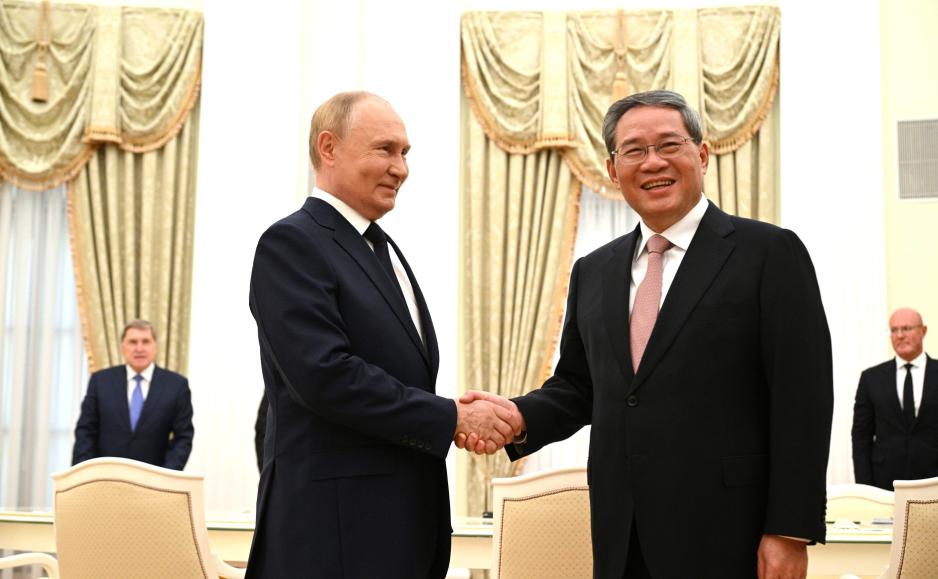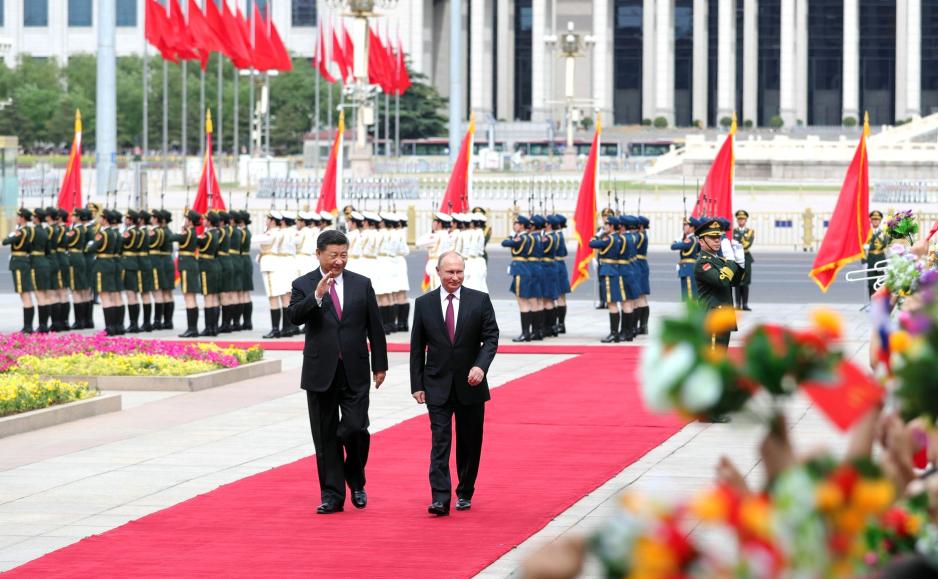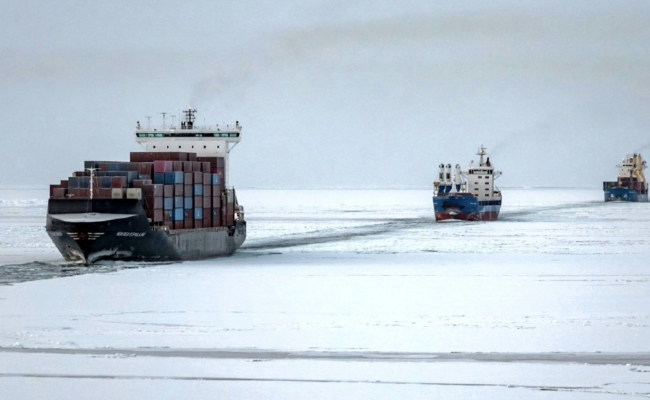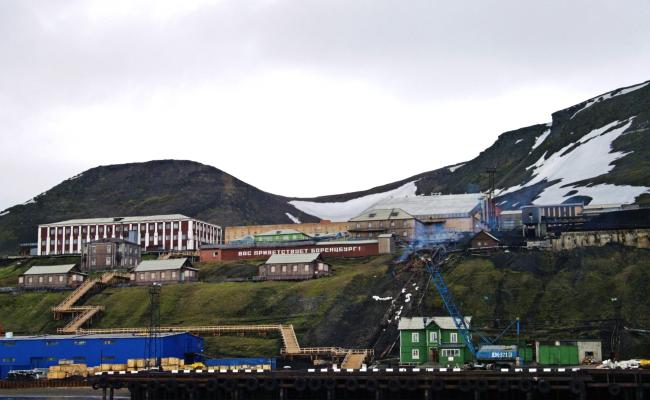"The Cooperation Between Russia and China in the Arctic Is Still Limited"

China's Premier Li Qiang met Vladimir Putin in the Kremlin on August 21st this year. (Photo: Alexei Filippov, RIA Novosti)
Researchers at the Norwegian Institute for Defence Studies believe the cooperation between Russia and China in the Arctic is still limited despite significant focus and increased attention. "The Arctic is not a priority for China, while Russia fears Chinese influence in this strategically important region," writes Ingvill Moe Elgsaas and Rebekka Åsnes Sagild.
Senior Researchers Ingvill Moe Elgsaas and Rebekka Åsnes Sagild at the Norwegian Institute for Defence Studies (IFS) recently published an article titled "Russia and China in the Arctic: Symbolic Politics of Little Substance?" in IFS Insights. They argue for a sober understanding of the potential for Russian-Chinese cooperation in the Arctic.
The researchers believe there are limited indications that the cooperation between Russia and China will expand, but we will most likely see more examples of symbolic declarations of intent in the coming time.
In a comment to High North News, the researchers state:
"Both China and Russia have great potential to threaten European security, and this undoubtedly contributes to the significance of and interest in the cooperation between them, also in our immediate areas. But reasoning à la "my enemy's enemy is my friend" should be taken with a pinch of salt."
"Although they share some interest, there are challenges for Russian-Chinese cooperation. We have pointed out several of these in the article: mutual skepticism and a lack of trust, asymmetric power balance (who will steer the ship?), and the asymmetry in the (self)interest in the Arctic. The threat potential they represent, both individually and perhaps sometimes together, should be taken seriously."

Ingvill Moe Elgsaas and Rebekka Åsnes Sagild at the Institute for Defence Studies. (Photo: the Norwegian Armed Forces)
Russia possesses half of the Arctic region and has great ambitions for its development in order to better exploit the rich natural resources and the Northern Sea Route (NSR).
"Russia is ambitious to establish this route as an alternative transit method between Europe and Asia," writes the researchers in the article.
High North News has kept a close eye on the development of the NSR. In May, the first non-ice class container ship received a permit for the Northern Sea Route, which faced a record summer when the season opened on July 1st.
"The Northern Sea is now a direct gateway to world markets. We must ensure a significant increase in freight transport through the sea route to implement the tasks assigned by Russia's president," said Nikolai Patrushev recently. He is the aide to Russian President Vladimir Putin and the leader of the country's new maritime collegium.
However, exploiting the Arctic resources proves costly and requires technology Russia has yet to possess.
"Traditionally, the Western Arctic states have been Russia's preferred cooperation partners in the region, but this cooperation was significantly weakened after Russia's illegal annexation of Crimea in 2014 and further worsened after the full-scale invasion in 2022," writes Elgsaas and Sagild.
Thus, Russia and China have developed closer ties in step with the Western isolation of Russia.
High North News recently wrote about a report showing 98 percent of cargo flowing between ports of the two countries so far this summer season.

China's President Xi Jinping and Russia's President Vladimir Putin in May this year. (Photo: Kremlin.ru)
The Arctic is not a Chinese priority
The researchers write that China has shown increased interest in the Arctic in the last decades compared to earlier, particularly after establishing a Chinese-Russian research center in 2018.
Yet, despite this increased interest, the researchers believe that the Arctic is not a priority for China. They believe the Chinese interest in the Arctic is mainly linked to their status as an important global actor and to research.
"Chinese investments in the Arctic are best described as intentions rather than practice, as there are few examples of actually conducted projects," the article reads.
In a comment to High North News, the researchers elaborate:
"The Arctic is far away. China is a big country with many challenges internally and in their own immediate areas – all highly prioritized over the Arctic. At the same time, it is clear that China is trying to involve itself in the Arctic where there are possibilities, but that is different from saying that the Arctic is a priority."
Russia's warfare in Ukraine is making the country increasingly more isolated, and China, therefore, emerges as the best cooperation partner for Russia. However, this does not mean that China is fully committed to cooperation in the Arctic, according to the researchers.
"Contrarily, Chinese researchers also find clear arguments against increased economic cooperation, particularly due to the high economic risk linked to investments in Arctic oil and gas developments. In addition, Chinese companies are skeptical of investing because of the risk of becoming subject to secondary sanctions, which would impact countries cooperating with sanctioned countries such as Russia.
The researchers also refer to the Chinese academic debate on security cooperation in the Arctic:
"Military and security matters are of secondary significance."
Chinese researchers promote a cautious approach to the Russian Arctic, as the Arctic is far more important to Russia than China. The Arctic is of great strategic value to Russia but less significant to China than other foreign policy areas.
Symbolic politics
The two senior researchers believe that future cooperation between Russia and China in the Arctic will be even further characterized by symbolic politics and base itself on declarations of intent to a higher degree than actual deeper cooperation.
Both parties hold back on developing deeper cooperation in the Arctic. For China, the Arctic is not high enough on its list of priorities, and it is not worth any possible reactions from the US.
On Russia's part, it is due to a desire to maintain sovereign self-determination in a region that is very important to them. This is particularly about the increasing power imbalance between the two states, in China's favor, and Russia not wanting interference from such a geopolitical heavyweight, according to the researchers.
"The most likely scenario for Russian-Chinese cooperation in the Arctic in the near future is that it will continue in the form of letters of intent and signaling to their shared "enemy" in the West. It is unlikely that any substantial cooperation will develop as long as Russia fears Chinese influence while also lacking real cooperation partners to act as a counterweight against Chinese influence," states the two IFS researchers.
When asked by High North News whether they consider the cooperation between Russia and China to be exaggerated in the media and other research, they reply:
"No, we do not necessarily believe that the cooperation is exaggerated. Rather, the attention paid to Russian-Chinese cooperation in the Arctic shows that this is an important and interesting topic that we should follow, something we agree with."
"At the same time, it is important to put this into context. It is not unnatural that Russia and China cooperate, also in the Arctic. However, even though there is cooperation between them, it does not mean that China and Russia cooperate well. A lot of the cooperation entails declarations of intent (of which we have many examples) and have little substance thus far."
"We believe this is a topic deserving of closer examination, particularly regarding which cooperations are (s far) only intentions, which are substantial, and not least, how the cooperation works in these cases."
Knows no limits
Russia and China have previously described their relationship as "knowing no limits."
So far, the two actors have managed to put their conflicting ambitions aside to cooperate. While China wants an internationalization of the Arctic, Russia wants to secure sovereign national rights over the largest possible area and as many resources as possible, the researchers write.
"The big question now is whether Russia and China will expand their cooperation in the Arctic in the coming time – in light of the geopolitical situation, Russia and China's respective interests in the Arctic, the relationship between them, and their respective relations to other parties," they conclude.




